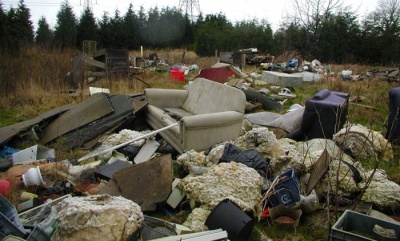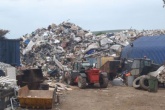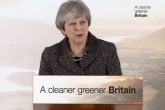New waste crime powers beef up Environment Agency enforcement at problem sites
The Environment Agency (EA) will be able to block access and force operators to clear all their waste at problem waste sites, not just illegal ones, under new waste crime powers introduced by the government this week.
Following on from the publication of Defra’s 25 Year Environment Plan last week, Resources Minister Therese Coffey today (15 January) announced the new powers, alongside the launch of a consultation to tackle crime and poor performance in the waste sector.
 Proposals in the consultation, which is open until 26 March 2018, include raising the bar required to hold EA waste permits and putting a stop to criminals hiding illegal activities by requiring them to register low-risk waste operations that are currently exempt from requiring permits.
Proposals in the consultation, which is open until 26 March 2018, include raising the bar required to hold EA waste permits and putting a stop to criminals hiding illegal activities by requiring them to register low-risk waste operations that are currently exempt from requiring permits.
Waste crime in England costs £604 million a year in losses to the waste industry and the taxpayer through lost landfill tax revenues and clean-up costs, and according to government figures, councils in England spent £50 million clearing up incidences of fly-tipping in 2016. The Environmental Services Association, which represents the legitimate waste industry, last year spoke out against the gaps in regulations and damage that relaxed exemptions were having on the industry.
Launching the new powers, Coffey said: “Waste crime and fly-tipping blight our communities and spoil our countryside, and we need determined action to tackle it. These new powers for the Environment Agency will curb the rise of waste sites that continue to operate outside the law.
“But we must all take responsibility for our waste to make sure it does not end up in the hands of criminals who will wilfully dump it. Our new consultation looks more widely at the waste sector and we are keen to hear from industry and the public how we can improve performance, tackle illegality and protect our precious environment.”
The new powers for the EA to tackle problem waste sites will be introduced by spring 2018, subject to parliamentary approval. The decision to enhance enforcement follows a public consultation that showed an overwhelming majority (90 per cent) of respondents were in favour of allowing regulators to take physical steps, such as locking the gates to an illegal waste site, to prevent operators from accepting more illegally dumped waste and enabling the EA to require all the waste to be removed.
 The government wants to inform the public about their duties when it comes to disposing of waste
Public awareness
The government wants to inform the public about their duties when it comes to disposing of waste
Public awareness

The consultation also proposes improving awareness amongst the public, so that residents can check on the EA’s website whether the recipient of their waste is licensed to take their waste.
It also suggests giving local authorities the option to fine those whose waste is eventually fly-tipped or illegally dumped, rather than having to pursue them through the courts. Illegally dumped waste often contains ways to identify its origins, and residents are obliged by their Duty of Care to ensure that anyone taking away their waste is registered to do so, or else face punishment themselves.
“This will allow us to take faster action against criminals and will make a real difference to communities, but everyone has a role to play,” said Emma Howard Boyd, Chair of the EA. “ We all need to check our waste is going to the right place and is handled by the right people.”
In 2016, EA Chief Executive Sir James Bevan told the Guardian that “Waste is the new narcotics”, explaining that the quick, community-damaging profits being made by waste criminals “feels… like drugs felt in the 1980s”. He explained: “The strategy is to work with the good guys and really nail the bad guys. We are both finding more [illegal sites] and nailing more. As the statistics show, we haven’t cracked it yet and it will be a long grind, but we are making progress.”
More than 850 new illegal waste sites were discovered by the EA in 2016/17. While an average of two illegal waste sites are shut down every day, they continue to create severe problems for local communities and business as well as posing a risk to key national infrastructure.
‘We need to weed out the cowboys’
Responding to the launch of the waste crime consultation, the Chartered Institution of Wastes Management (CIWM) said the new powers and proposals will be ‘critical’ in fighting the growing tide of waste crime.
“On the front line, regulators need to be able to act much more quickly,” said CIWM Chief Executive Colin Church. “Allowing them to shut down illegal sites and stop rogue operators in their tracks will help to tackle or avoid major polluting incidents like the Waste4Fuel site in Kent or the massive Mobuoy Road dump in Northern Ireland that blight communities and cost the public purse millions of pounds.”
“In the longer term, we need to weed out the cowboys and those who are using loopholes in the current regulatory regime, and raising the bar on competency and reviewing the exemptions system are good places to start. CIWM would like to see more, however. One of the real weaknesses of our current framework is a lack of focus on waste carriers, brokers and dealers, who can register for very little cost, with no requirement to demonstrate technical competence and few, if any, inspections.
“The focus on householder Duty of Care is also welcome. Local authorities deal with nearly a million fly-tipping incidents a year and around two-thirds of these involve household waste. We need to choke off the supply of waste to illegal operators by improving awareness and ensuring that those who deliberately flout their responsibilities are penalised.”








